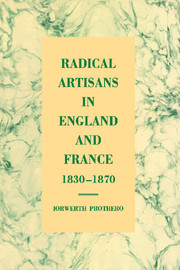Book contents
- Frontmatter
- Contents
- Acknowledgements
- List of abbreviations
- Introduction
- 1 Artisans
- 2 Radicalisms
- 3 Trade unionism
- 4 Work and radicalism
- 5 Socialism
- 6 Co-operation
- 7 Class and radicalism
- 8 Political action and organisation
- 9 Education and civilisation
- 10 Religions and philosophy
- 11 The culture of radical clubs
- Conclusion
- Notes
- Select bibliography
- Index
5 - Socialism
Published online by Cambridge University Press: 24 November 2009
- Frontmatter
- Contents
- Acknowledgements
- List of abbreviations
- Introduction
- 1 Artisans
- 2 Radicalisms
- 3 Trade unionism
- 4 Work and radicalism
- 5 Socialism
- 6 Co-operation
- 7 Class and radicalism
- 8 Political action and organisation
- 9 Education and civilisation
- 10 Religions and philosophy
- 11 The culture of radical clubs
- Conclusion
- Notes
- Select bibliography
- Index
Summary
Radicalism, as we have seen, can be viewed as an inherited ideology, not emanating from the world of work, though modified in its practice by artisan concerns. Yet it is argued that experience at work produced a ‘new ideology’ that challenged or supplanted traditional radicalism in ways more relevant to workers' situations. Ideas on the evils of competition, the workers' right to property in their labour, bourgeois exploitation, and the need for a new socialist economic organisation are seen as seeping up from workers and modifying a purely political radicalism. Thus at the start of our period Owen and O'Brien declared that ‘mere’ political reform was no good, and at the end of it Varlin predicted that the next revolution would not be a merely political one, but would free workers from all exploitation, political and capitalist, so that the workers could control the means of production and exchange. It is particularly in France that the influence of the new socialist creed is recognised, its strength there in fact marking a contrast to England.
To assess the content and importance of socialism among popular movements, we should not look mainly at the various socialist schools. Saint-Simonism and Fourierism had little popular impact, and while some of their few working-class adherents did run a few periodicals, their small readership consisted of non-workers at least as much as workers. While an important Owenite ‘Socialist’ movement grew after 1834, to reach a peak in 1840, it rapidly declined thereafter, and the most distinctive element in Owenite thought, communitarianism, was the least influential.
- Type
- Chapter
- Information
- Radical Artisans in England and France, 1830–1870 , pp. 120 - 144Publisher: Cambridge University PressPrint publication year: 1997

